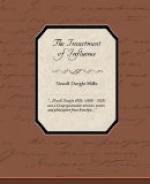For the poet that selfsame oak is enshrined in a thousand noble associations. It sings for him like a hymn; it shines like a vision; it suggests ships, storms and ocean battles; the spear of Launcelot, the forests of Arden; old baronial halls mellow with lights falling on oaken floors; King Arthur’s banqueting chamber. To the scientist’s thought the oak is a vital mechanism. By day and by night, the long summer through, it lifts tons of moisture and forces it into the wide-spreading branches, but without the rattle of huge engines. With what uproar and clang of iron hammers would stones be crushed that are dissolved noiselessly by the rootlets and recomposed in stems and boughs! What a vast laboratory is here, every root and leaf an expert chemist!
For other multitudes the earth has become only a huge stable; its fruit fodder; its granaries ricks, out of which men-cattle feed. These estimate a man’s value according as he has lifted his ax upon tall trees and ravaged all the loveliness of creation; whose curse is the Nebuchadnezzar curse, giving to nature the tongue and hand, and receiving from nature grass; who are doomed to love the corn they grind, to hear only the roar of the whirlwind and the crash of the hail, never “the still small voice;” who see what is written in lamp-black and lightning; who think the clouds are for rain, and know not that they are chariots, thrones and celestial highways; that the sunset means something else than sleep, and the morning suggests something other than work. All these give nature only thought for food, and food only shall they receive from nature, until all their deeds are plowed down in dust. Give forth thy gift, young men and maidens, and according as thou givest thou shalt receive fruit, or picture, or poem, or temple, or ladder let down from heaven, or angel aspirations going up.
Conscience also receives its gifts and makes a return. Give thy body obedience and it will return happiness and health. Give overdrafts and excesses and it will return sleepless nights and suffering days. Man’s sins are seeds, his sufferings harvests. Every action is embryonic, and according as it is right or wrong will ripen into sweet fruits of pleasure or poison fruits of pain. Some seeds hold two germs; and vice and penalty are wrapped up under one covering. Sins are self-registering and penalties are automatic. The brain keeps a double set of books, and at last visits its punishments. Conscience does not wait for society to ferret out iniquity, but daily executes judgment. Policemen may slumber and the judge may nod, but the nerves are always active, memory never sleeps, conscience is never off duty. The recoil of the gun bruises black the shoulder of him who holds it, and sin is a weapon that kills at both ends.




